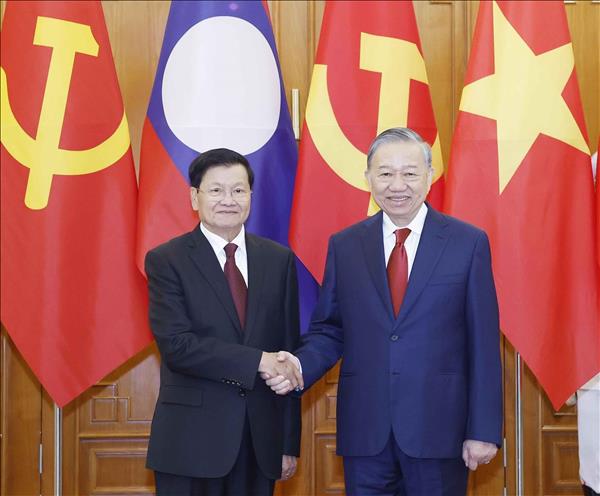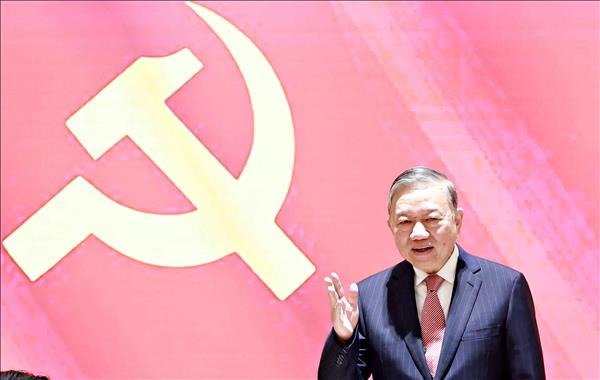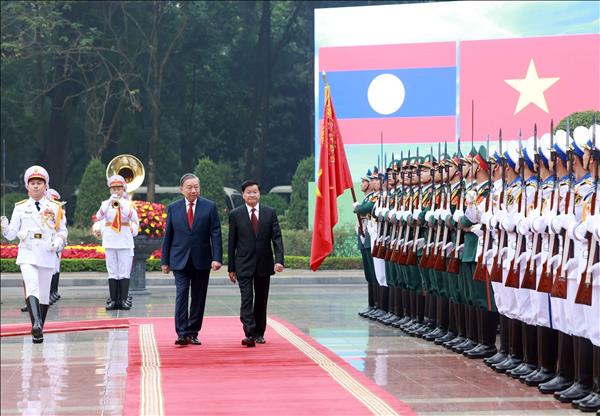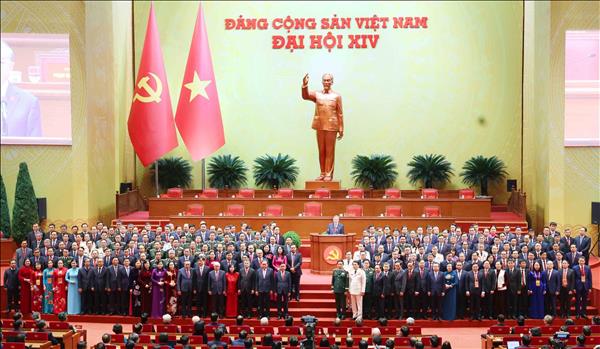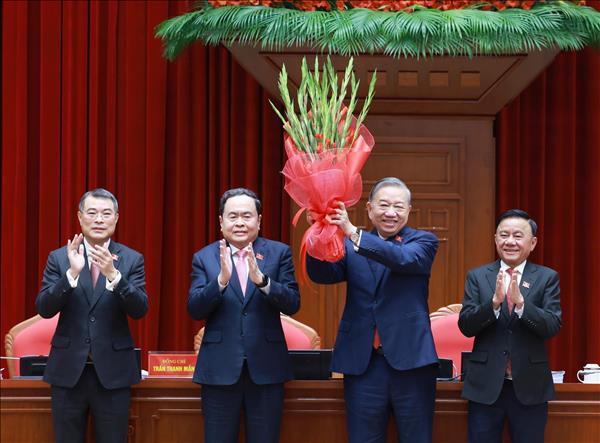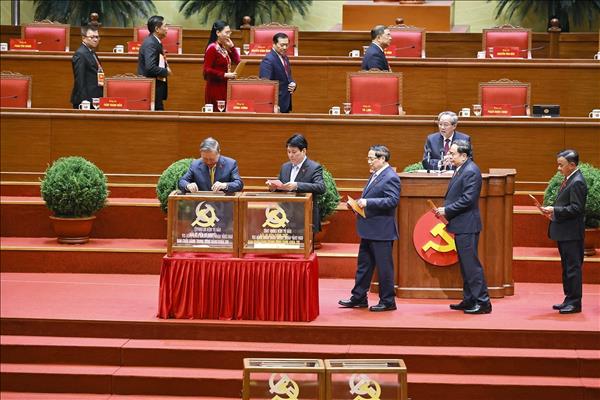The visit demonstrated that Vietnam treasures the traditional friendship and comprehensive strategic partnership with Russia, and wishes to strengthen the all-round cooperation, especially in economy, trade and investment.
Russia was one of the first nations to recognize and establish diplomatic relations with Vietnam on January 30, 1950, which had laid the foundation for the close friendship and comprehensive ties between the two countries.
Following efforts to develop the bilateral relations in the 1990s, the countries set up their strategic partnership in 2001, and upgraded the ties to the comprehensive strategic partnership in 2012.
The two countries’ politic cooperation has had high trust with various collaboration forms. They have set up and maintained annual high-level meetings as well as close coordination at international forums, especially at the United Nations as well as ASEAN-led cooperation mechanisms.
Russia was one of the first nations to recognize and establish diplomatic relations with Vietnam on January 30, 1950, which had laid the foundation for the close friendship and comprehensive ties between the two countries.
Following efforts to develop the bilateral relations in the 1990s, the countries set up their strategic partnership in 2001, and upgraded the ties to the comprehensive strategic partnership in 2012.
The two countries’ politic cooperation has had high trust with various collaboration forms. They have set up and maintained annual high-level meetings as well as close coordination at international forums, especially at the United Nations as well as ASEAN-led cooperation mechanisms.
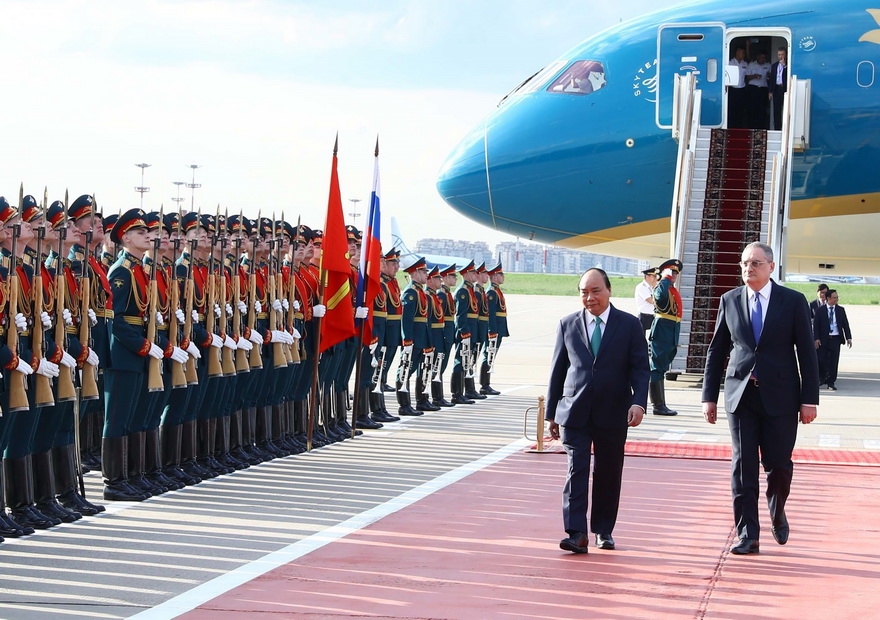 PM Phuc and Russian Deputy Foreign Minister Igor Morgulov review the honor guard at the welcome ceremony for the former at Vnukovo 2 airport in Moscow . Photo: Thong Nhat/VNA 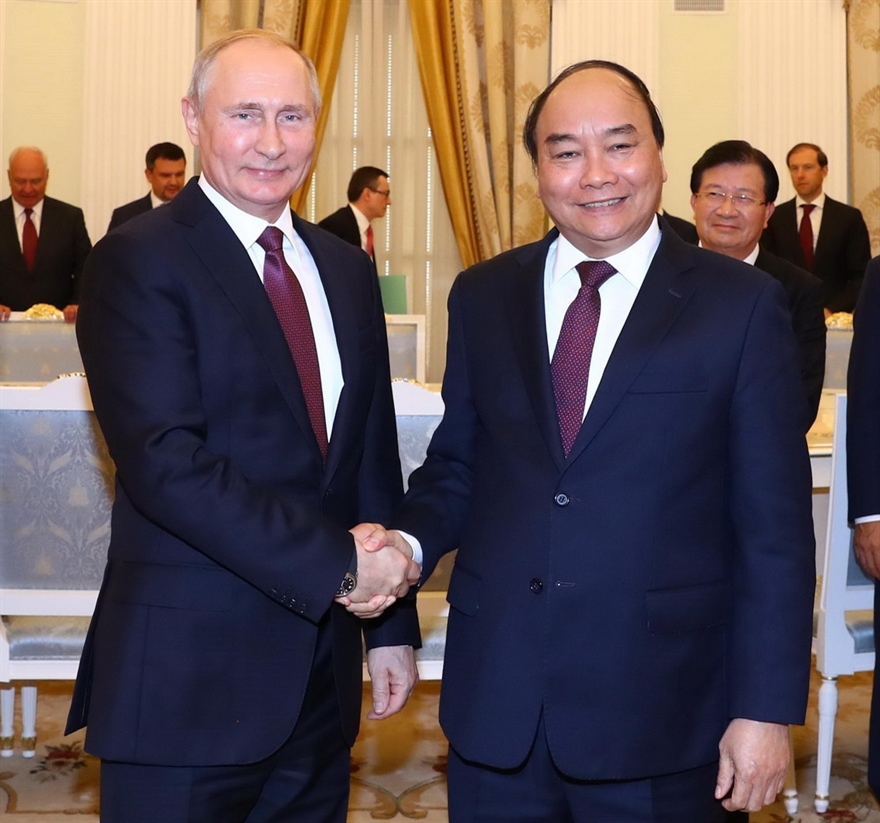 The Vietnamese Prime Minister has a meeting with Russian President Vladimir Putin. Photo: Thong Nhat/VNA 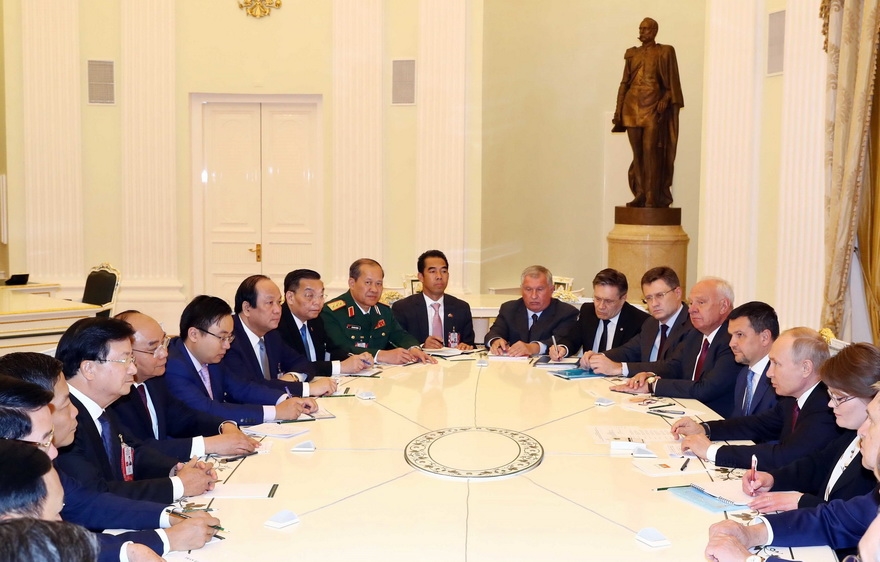 The meeting between PM Phuc and President Putin at Kremlin Palace in Moscow. Photo: Thong Nhat/VNA 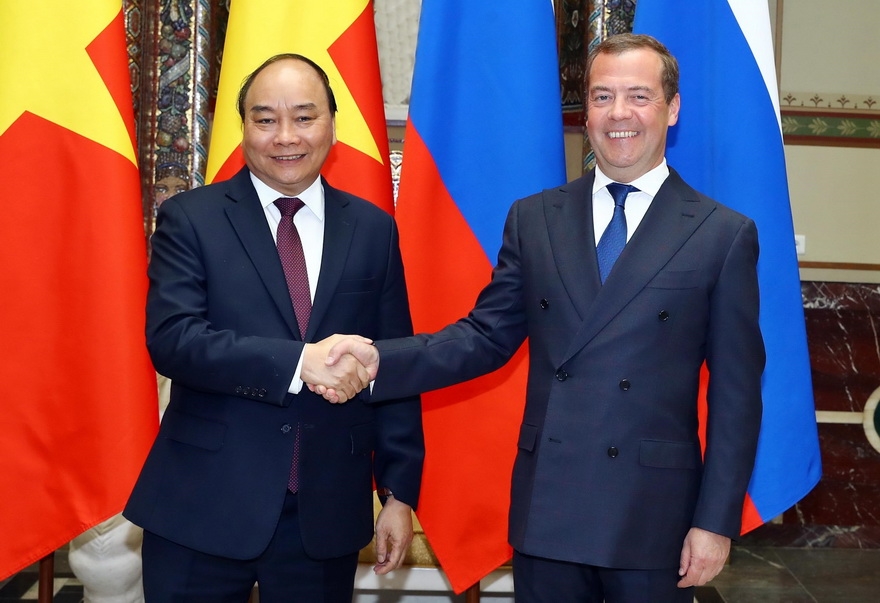 PM Nguyen Xuan Phuc holds talks with his Russian counterpart Dmitry Medvedev. Photo: Thong Nhat/VNA 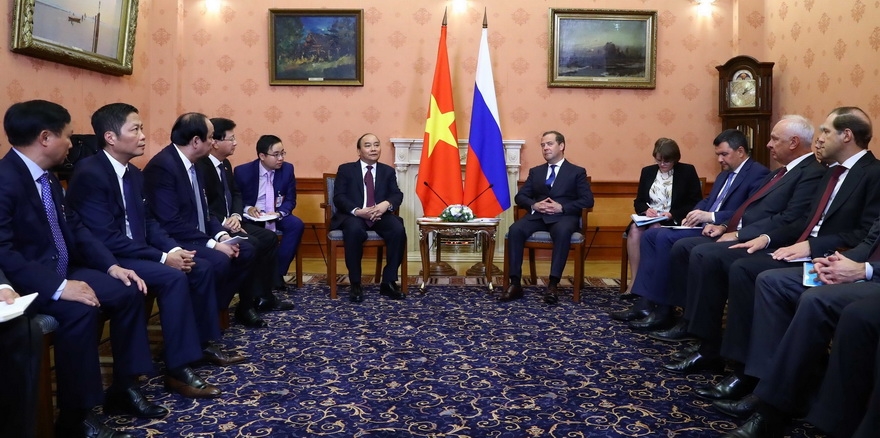 The two Prime Ministers at their meeting. Photo: Thong Nhat/VNA 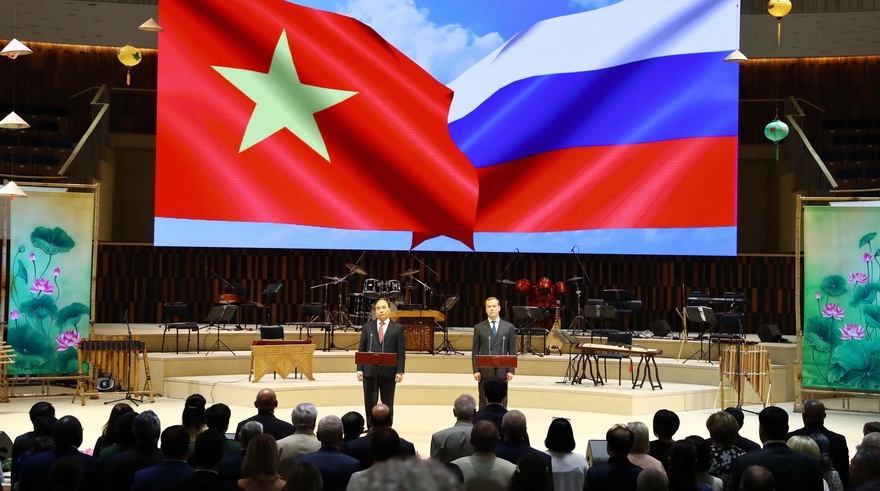 The two Prime Ministers attend a ceremony unveiling Vietnam’s Year in Russia and Russia's Year in Vietnam. Photo: Thong Nhat/VNA  Prime Minister Nguyen Xuan Phuc presents a Dong Ho folk painting to Russian Prime Minister Dmitry Medvedev at a photo exhibition on Vietnam, its people and culture in Moscow. Photo: Thong Nhat/VNA 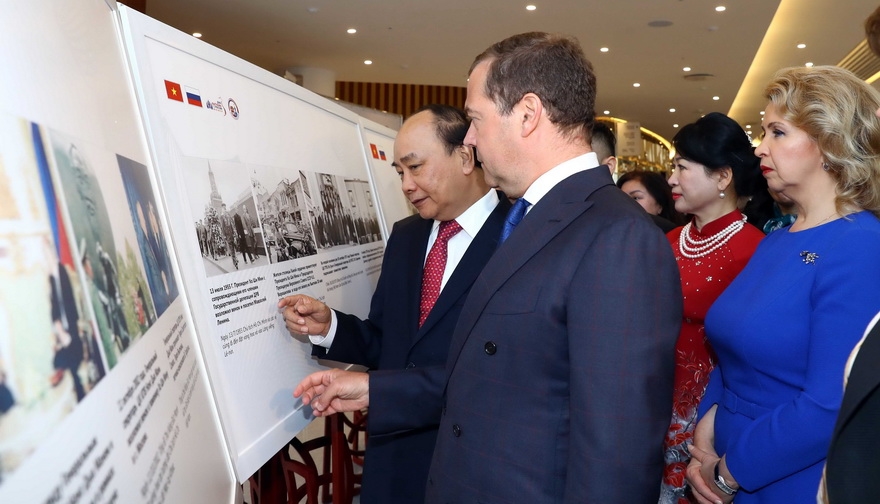 The two PMs and their spouses at the exhibition. Photo: Thong Nhat/VNA |
Both countries shared the same viewpoint on various regional and international issues, and supported each other at international forums like the UN, Asia-Pacific Economic Cooperation (APEC), Asia-Europe Meeting and ASEAN Regional Forum (ARF).
Russia endorsed Vietnam's position on settlement of disputes on the East Sea via peaceful measures based on international law, including the 1982 United Nations Convention on the Law of the Sea (UNCLOS) and the Declaration on the Conduct of Parties in the East Sea (DOC), and building the Code of Conduct in the East Sea (COC) soon.
Progress has been made in two-way trade which increased from 2.7 billion US dollars in 2016 to 3.55 billion US dollars in 2017 and 4.5 billion US dollars last year. In the first two months of 2019, the figure stood at 790 million US dollars, up 9.4 percent year-on-year.
The two PMs witness the signing of cooperation documents between the two countries
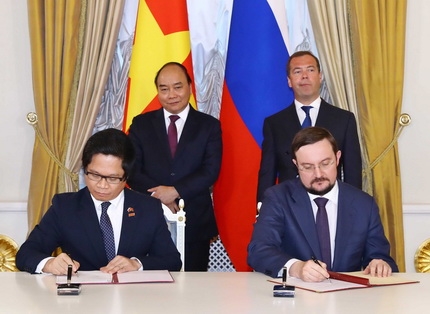 |
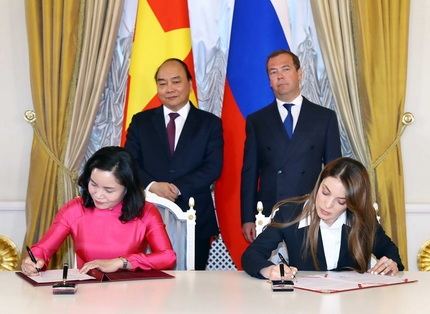 |
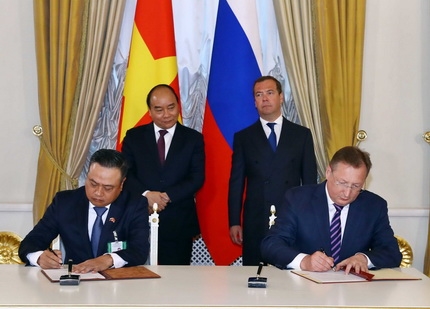 |
 |
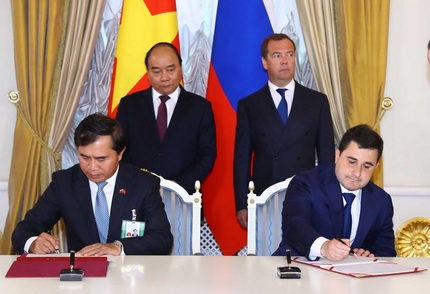 |
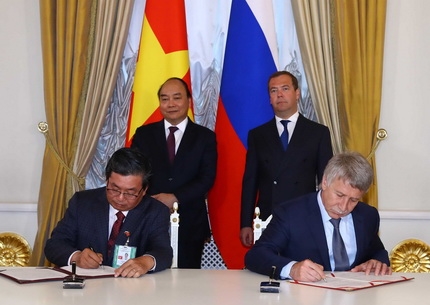 |
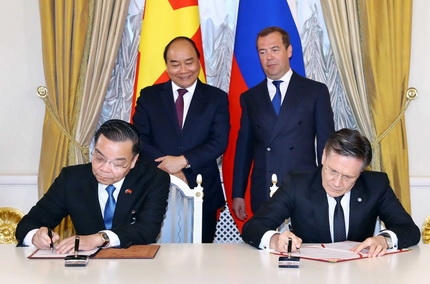 |
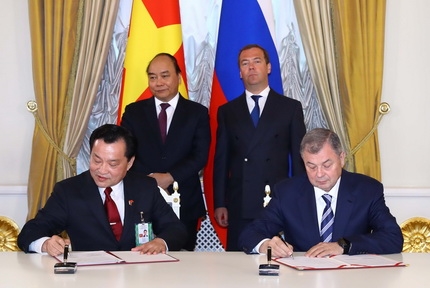 |
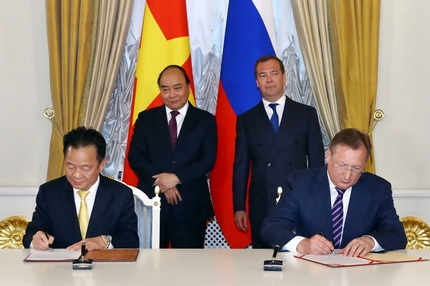 |
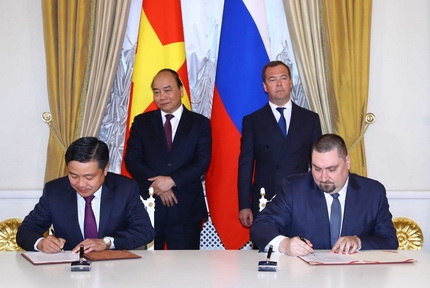 |
Vietnam’s major exports to Russia include phones, garments-textiles, and agro-fishery products. Meanwhile, Russia ships petroleum, steel, fertilizers, machines and equipment to the Southeast Asian nation.
As of February 2019, Russia ranked 24th among countries and territories investing in Vietnam with 127 projects worth over 950 million US dollars, mainly focusing on mining, oil and gas, and processing and manufacturing industry.
Vietnam has run more than 20 projects in Russia with total capital amounting to nearly 3 billion US dollars, with the Rusvietpetro joint venture, the Hanoi-Moscow cultural and commercial center and farms of TH Groups being outstanding examples.
Energy has been seen as a traditional, strategic, effective cooperation area between Vietnam and Russia, significantly contributing to the state budget of both countries. Apart from Vietsovpetro joint venture, Russia’s major oil and gas groups like Gazprom and Rosneft will deploy many projects on Vietnam’s continental shelf by 2030. Meanwhile, Rusvietpetro is carrying out another project in a Russian autonomous region.
Russia has become one of Vietnam’s ten biggest sources of tourists and the largest in Europe. The number of Russian holiday-makers to Vietnam rose from 176,000 in 2012 to 606,000 last year.
The Vietnamese community in Russia of nearly 10,000 people considers Russia as the second homeland. Thousands of Vietnamese students are studying at prestigious universities in the country. The two nations’ people-to-people exchanges have helped consolidate and develop the Vietnam-Russia comprehensive strategic partnership./.
As of February 2019, Russia ranked 24th among countries and territories investing in Vietnam with 127 projects worth over 950 million US dollars, mainly focusing on mining, oil and gas, and processing and manufacturing industry.
Vietnam has run more than 20 projects in Russia with total capital amounting to nearly 3 billion US dollars, with the Rusvietpetro joint venture, the Hanoi-Moscow cultural and commercial center and farms of TH Groups being outstanding examples.
Energy has been seen as a traditional, strategic, effective cooperation area between Vietnam and Russia, significantly contributing to the state budget of both countries. Apart from Vietsovpetro joint venture, Russia’s major oil and gas groups like Gazprom and Rosneft will deploy many projects on Vietnam’s continental shelf by 2030. Meanwhile, Rusvietpetro is carrying out another project in a Russian autonomous region.
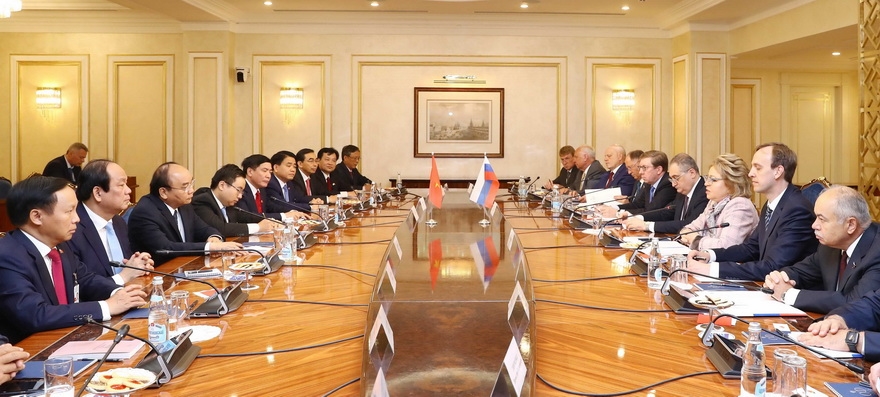 PM Phuc has a meeting with Chairwoman of the Federation Council (upper house) of the Federal Assembly of Russia Valentina Ivanovna Matviyenko. Photo: Thong Nhat/VNA 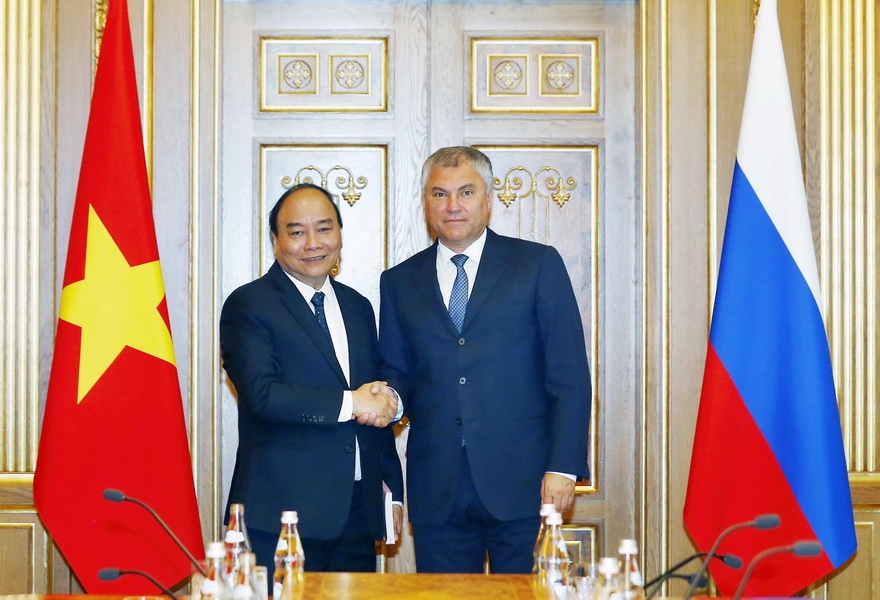 He meets with Chairman of the State Duma of the Federal Assembly of the Russian Federation Vyacheslav Viktorovich Volodin in Moscow. Photo: Thong Nhat/VNA  The Vietnamese PM attends the Vietnam-Russia Business Forum in Moscow. Photo: Thong Nhat/VNA 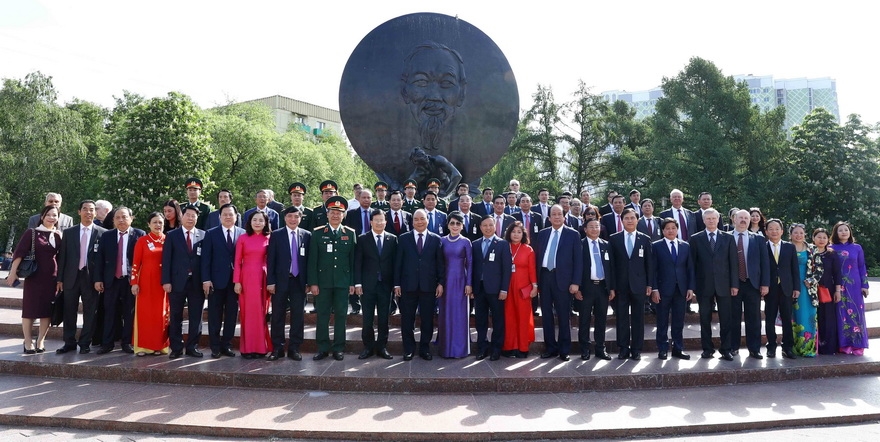 PM Phuc visits President Ho Chi Minh Monument in Moscow. Photo: Thong Nhat/VNA 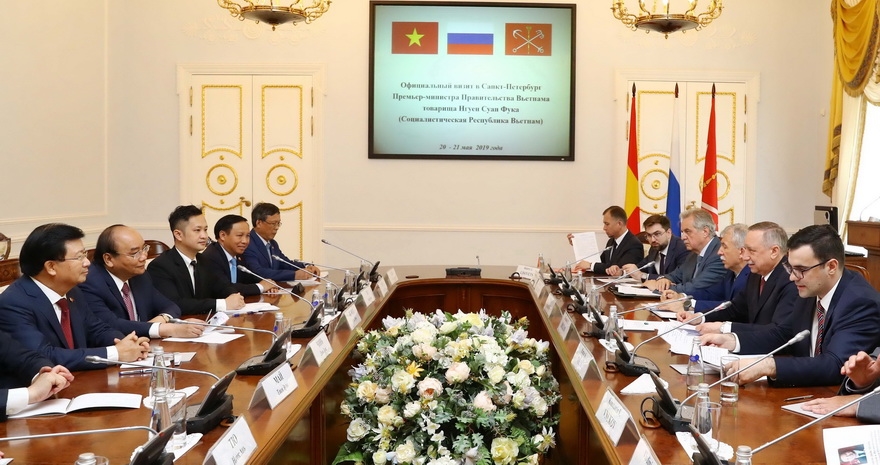 The Vietnamese leader has a meeting with acting Governor of Saint Petersburg Alexander Beglov. Photo: Thong Nhat/VNA 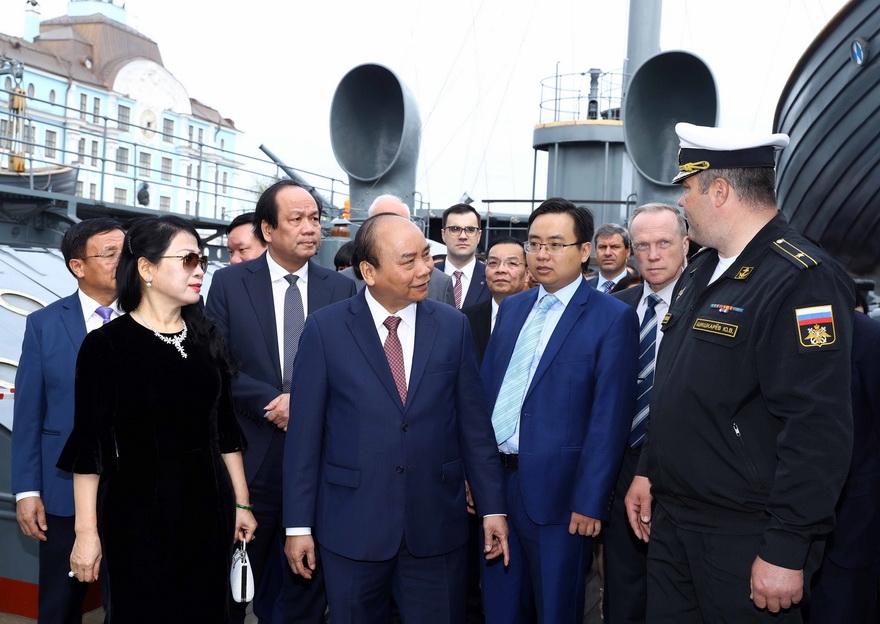 PM Phuc and his wife visit cruiser Aurora in Saint Petersburg. Photo: Thong Nhat/VNA 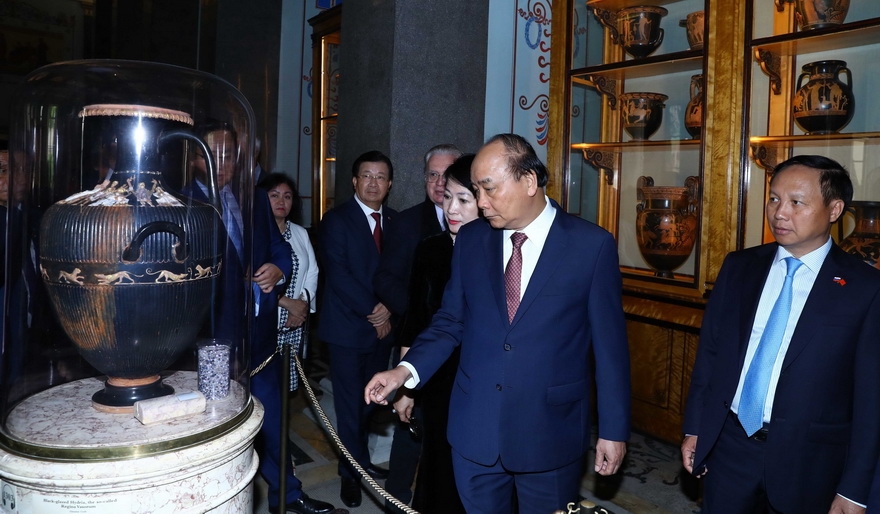 The Vietnamese leader and his entourage tour the Winter Palace. Photo: Thong Nhat/VNA 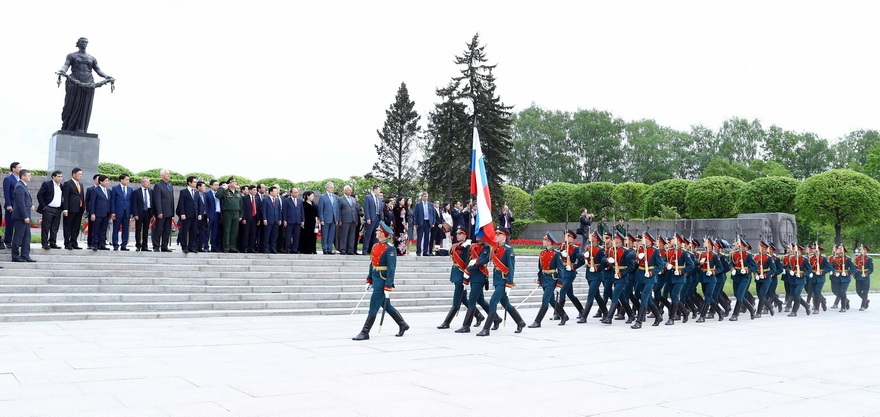 He also lays a wreath at the Piskaryovskoye Memorial Cemetery in Saint Petersburg. Photo: Thong Nhat/VNA 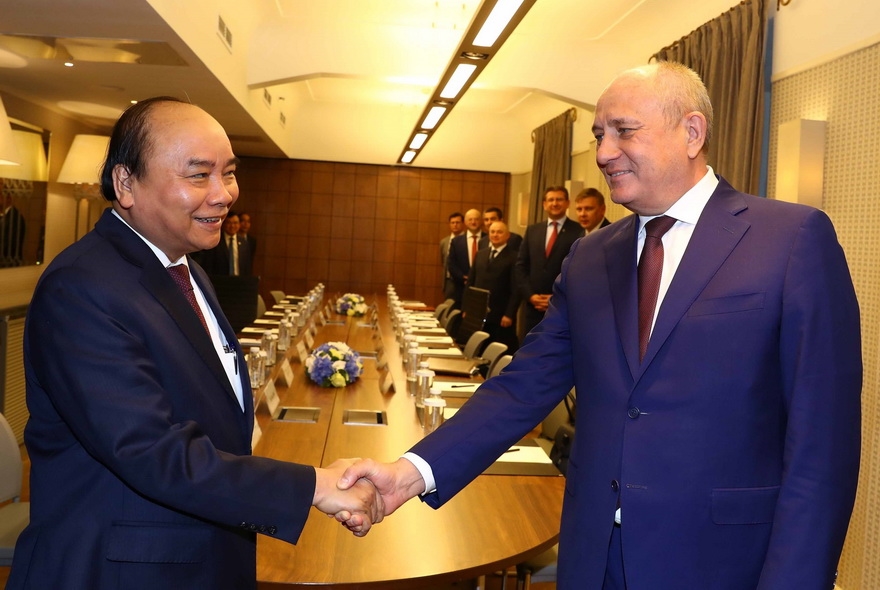 PM Phuc receives Deputy Chairman of the Gazprom Management Committee Vitaly Markelov in Saint Petersburg. Photo: Thong Nhat/VNA 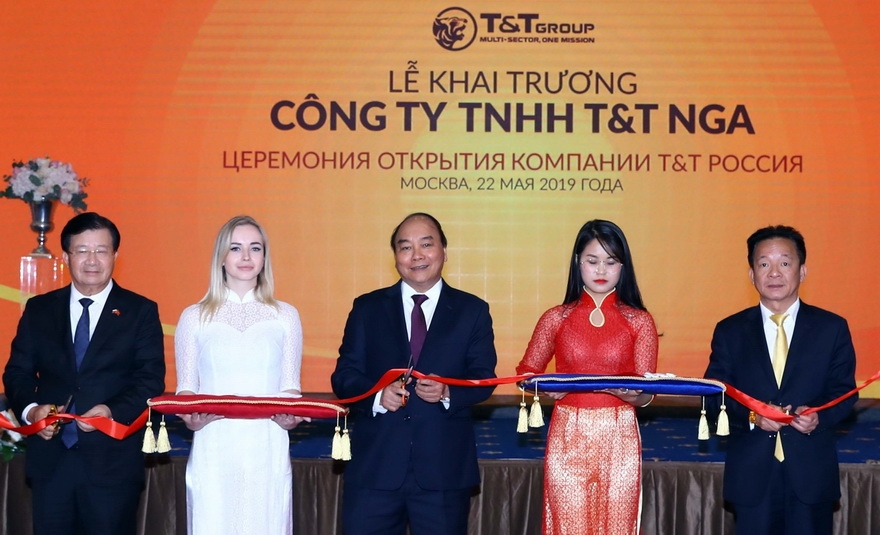 He attends the launching ceremony of T&T Group in Moscow. Photo: Thong Nhat/VNA  PM Phuc has successfully concluded his official visit to Russia. In the photo: The Vietnamese PM and delegates at the farewell ceremony. Photo: Thong Nhat/VNA |
Russia has become one of Vietnam’s ten biggest sources of tourists and the largest in Europe. The number of Russian holiday-makers to Vietnam rose from 176,000 in 2012 to 606,000 last year.
The Vietnamese community in Russia of nearly 10,000 people considers Russia as the second homeland. Thousands of Vietnamese students are studying at prestigious universities in the country. The two nations’ people-to-people exchanges have helped consolidate and develop the Vietnam-Russia comprehensive strategic partnership./.
VNP - Photos: VNA

